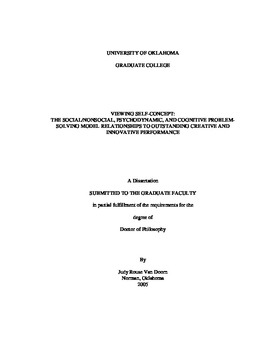| dc.description.abstract | Self-concept, considered prioritized goal hierarchies, that creative individuals embrace is considered a primary motivator leading to their eminent, creative achievement and notable, novel performance. The dynamic formation of self-concept is a cognitively, organized knowledge structure that can acquire, process, and evaluate personal characteristics, life events, traits, and values. Few studies have comprehensively examined self-concept profiles based on social and nonsocial traits, psychodynamic, and cognitive problem-solving theoretical models and respective relationships with creative and innovative performance. In this study, 103 university students completed a self-concept measure indicating past/present and future profiles with selected life events subsumed under self-described categories. Then, students completed three novel problems described as entrepreneurial, consulting with planning, and marketing with advertising exercises to assess creative ability. Subjects with self-concept views that aligned with nonsocial traits suggesting introversion, cognitive focus, and the psychodynamic influences of negative emotion, originality, and detail-orientation performed consistently higher on the creative business exercises. In addition, significant self-concept combinations across all three models indicated particular strengths in creative and innovative performance. The implications of these findings for assessing and understanding self-concept profiles associated with outstanding creative and innovative performance as well as potential are examined. | en_US |
